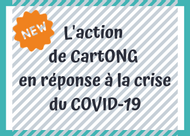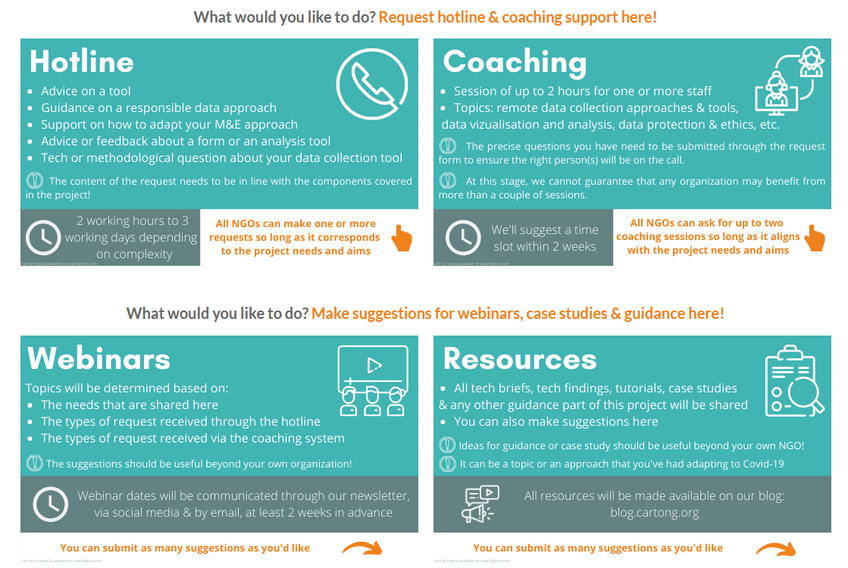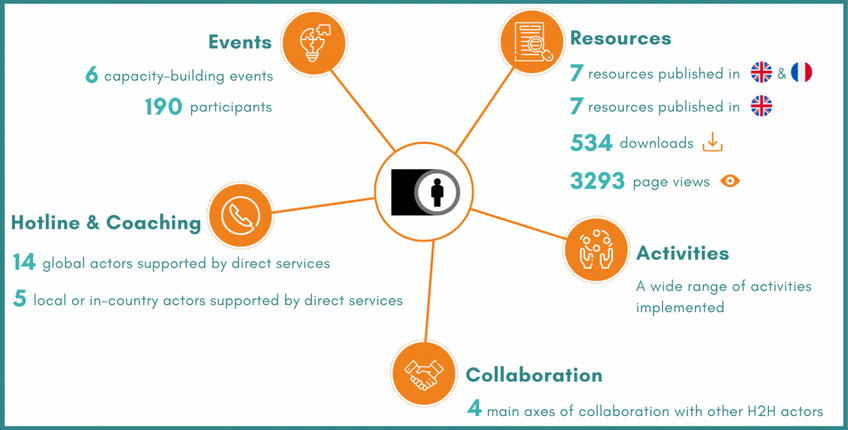Covid-19 Help Center: lessons learned

This article is a more detailled version of a blog post originally published on the H2H Network’s website on March 11th, 2021 and which was written by Marion Chranuski, IM Project Manager at CartONG. If you’d like to read it in French, please select the French version on our website.
At the beginning of the Covid-19 pandemic in February and March 2020, local, national and international NGOs rapidly realized that generalized remote working and physical distancing would represent a real challenge in terms of collecting and managing information for their projects. In CartONG, our teams quickly witnessed the changes it implied in the way data was used and managed in the humanitarian aid and international development sector with a sharp increase of requests for support in the early days of the health crisis – a significant number of them coming from small to medium-sized organizations that very rarely have the means to fund Information Management (IM) support.
As the H2H Network got organized to support its members and provide – in line with its mandate – funding for crisis response, CartONG submitted a proposal for a project aiming at assisting the humanitarian sector in adapting its Information Management (IM) and Monitoring & Evaluation (M&E) response to the Covid-19 crisis as part of the second support package on Covid-19 of the network which focused on supporting global-yet-local efforts to fight the pandemic and was funded by UK Aid. Additionally, CartONG decided to redirect some of the activities being implemented as part of the Strengthening program data management within francophone CSOs project co-financed by the French Development Agency (AFD) towards this initiative so we could better accompany the aid sector during the pandemic.
Aims of the project

As part of this initiative, CartONG was to provide direct support to NGOs addressing specific data-related requests at headquarters or in the field, as well as a more global support to the sector through the release of technical and methodological guidance (technical briefs, tutorials, tech watch findings) and feedback resources (case studies and lessons learned). Requests for support or for guidance could cover a wide range of IM topics – such as quantitative and qualitative data collections, data visualization and analysis, as well as responsible data management and data ethics – that would be tackled by our tech teams. For the Monitoring & Evaluation and accountability component of the project, CartONG teamed up with the H2H organization Groupe URD which is specialized on the topic.
In May 2020, we thus set up the IM Covid-19 Help Center on CartONG’s website to centralize the requests of local and international NGOs. The pro bono service consisted of two distinct direct support mechanisms: on the one hand, the hotline, and on the other hand, the coaching sessions which could be both requested via an online form. Additionally, aid actors could also give their input on what kind of written or training resources they were in need of by emailing CartONG via the Help Center.
A most revealing workshop
In June 2020, CartONG conducted a workshop with civil society organizations on the consequences of physical distancing on their data practices. Findings mainly emphasize the need for organizational adjustments and tool optimization to cope with the overall lack of technical preparation as well as the need to adapt Information Management (IM) and Monitoring & Evaluation (M&E) activities to cope with the increasing complexity of relationships with beneficiaries.
A few figures from 9 months of implementation
From May 2020 to January 2021, CartONG supported 19 local and global actors through the hotline or by delivering coaching sessions. Requests received via the hotline ranged from support to adapt Mobile Data Collection questionnaires to remotely managing surveys, as well as creating dashboards or dynamic maps for field teams.
As part of the project, CartONG also conducted 6 capacity building events and training gathering over 190 people to support new ways of collecting and managing data while remote working.
Additionally, one key component of this initiative was to make available open source guidance to the sector as a whole, with a focus on practical resources as well as feedback resources such as case studies and lessons learned (which are most useful to field teams). In total, we were able to publish 14 guidance resources (including 7 also translated in French). To date, these resources have been consulted around 3,300 times and, for the ones that could, been downloaded more than 530 times.

The importance of collaboration
It is important to note that CartONG worked with other H2H Network members to provide support – we did not do it alone! As previously mentioned, Groupe URD provided its expertise on Monitoring, Evaluation, Accountability, and Learning (MEAL) issues. As part of this collaboration, we were able to release 3 resources, such as this guidance on tools for digital CRM mechanisms.
Similarly, it was also understood from the start that we would aim to generate exchanges and cross-cutting support as much as possible with other H2H organizations. To this end, we set up a joint geospatial response with HOT and MapAction to formalize our collaboration and ensure rapid implementation when needed. Additionally, we were also able to release a joint guidance on mapping during a pandemic. We also produced a resource with Translators without Borders to tackle a cross-cutting topic between our two organizations: 20+ language tips for effective humanitarian data collection. This collaborative and complementary approach helped significantly improve the quality and the relevance of the support provided.
Overall, CartONG received positive feedback from the organizations supported whether through direct support, capacity-building events or online technical and methodological resources. 92% of respondents to the project’s satisfaction survey mentioned that the support fully met their needs, and 75% were fully able to overcome their difficulties.
“Please continue with this type of initiative. There is a real need for support in the sector.” – Anonymous quote from the satisfaction survey
“Many thanks for your support which allowed us to roll out a Covid tracking dashboard much sooner than we anticipated.” – Anonymous quote from the satisfaction survey
Collaborating with a panel of H2H organizations working beyond our usual scope of expertise, allowed us to cover a broad range of IM and cross-cutting topics, hence opening up the possibility for activities with new partners and on new subject matters. It was also an opportunity for CartONG to raise awareness on topics that are sometimes overlooked by NGOs – especially in times of crisis – such as responsible data.
So, what did we actually learn?
Communicating about our support offer, especially to field teams, proved complex. The project was however a great opportunity to build visibility, develop collaborations, and generate interest on Information Management topics.
We also learned that supporting humanitarian organizations in times of major crisis does not come easy. Most of the time, requests which reached us, were only unclearly defined. While there were clear gaps and difficulties to overcome, NGOs were not always able to identify the exact type of support they needed. Fortunately, our team was able to build on its IM diagnosis expertise in order to help them clarify their needs. Nonetheless, assisting in the needs definition process and ensuring that the response directly addressed them often required significant time investment beyond what we had anticipated.
This was especially true, as on several occasions the NGO in question required long-term support related to structuring IM processes rather than a one-off support to cope with the crisis. At CartONG, we tend to attribute this fact to the limited maturity of the aid sector in terms of Information Management, and more generally on data literacy. This is particularly the case in smaller to medium-size INGOs, in local or grassroots organizations, as well as within the francophone sphere.
Such a gap of knowledge and skills may have prevented humanitarian organizations from formalizing their needs (not knowing how) and reaching out to us. After a few months, we therefore intensified and diversified our outreach strategy, not only relying on the dissemination about the generic Help Center set up at the beginning of the initiative but also by networking more widely and reaching out via other dedicated IM fora.
Beyond the Covid-19 crisis, providing more long-term tailored IM support and continuing to build data literacy in the humanitarian sector remains a key issue that will not only require the commitment of IM H2H organizations – such as CartONG – but of the whole H2H community as well as supportive donors.
The IM Covid-19 Help Center was supported by the H2H Network’s H2H Fund, which is supported by UK aid from the UK government. It was also implemented as part of the “Strengthening Information Management within CSOs” project co-financed by the French Development Agency (AFD).
